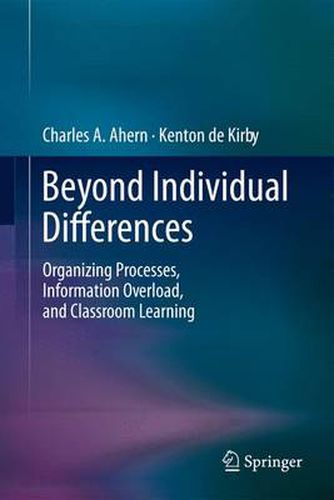Readings Newsletter
Become a Readings Member to make your shopping experience even easier.
Sign in or sign up for free!
You’re not far away from qualifying for FREE standard shipping within Australia
You’ve qualified for FREE standard shipping within Australia
The cart is loading…






This title is printed to order. This book may have been self-published. If so, we cannot guarantee the quality of the content. In the main most books will have gone through the editing process however some may not. We therefore suggest that you be aware of this before ordering this book. If in doubt check either the author or publisher’s details as we are unable to accept any returns unless they are faulty. Please contact us if you have any questions.
In an era of intense interest in educational reform, spurred by increasing global competition for jobs and advancement, it is more critical than ever to understand the nature of learning. And although much attention is paid to differences between learners, short shrift is often given to cognitive functions that characterize successful learning for all students. Yet these are the very functions that determine the difference between successful and rewarding learning versus merely doing without truly learning.
Firmly grounded in the principles of neuropsychology, Beyond Individual Differences analyzes both successful and unproductive learning in terms of the brain’s organizing processes - that is, its unconscious sifting, selecting, and meaning-making that enable students to incorporate and build on what they’ve learned in the past. At the same time, it explores the learning situations that cause organization to break down and offers several preventive strategies.
Key areas of coverage include:
The complex role of mental organization in learning and education. Specific organizing processes and the links to success or failure in learning. Information/cognitive overload. The student’s experience of learning and its impact on development.
Accommodating a range of individual differences in the classroom. Practices for supporting students’ unconscious organizing processes.
Beyond Individual Differences is essential reading for a wide range of professionals and policy makers as well as researchers and graduate students in school and clinical child psychology, special and general education, social work and school counseling, speech therapy, and neuropsychology.
$9.00 standard shipping within Australia
FREE standard shipping within Australia for orders over $100.00
Express & International shipping calculated at checkout
This title is printed to order. This book may have been self-published. If so, we cannot guarantee the quality of the content. In the main most books will have gone through the editing process however some may not. We therefore suggest that you be aware of this before ordering this book. If in doubt check either the author or publisher’s details as we are unable to accept any returns unless they are faulty. Please contact us if you have any questions.
In an era of intense interest in educational reform, spurred by increasing global competition for jobs and advancement, it is more critical than ever to understand the nature of learning. And although much attention is paid to differences between learners, short shrift is often given to cognitive functions that characterize successful learning for all students. Yet these are the very functions that determine the difference between successful and rewarding learning versus merely doing without truly learning.
Firmly grounded in the principles of neuropsychology, Beyond Individual Differences analyzes both successful and unproductive learning in terms of the brain’s organizing processes - that is, its unconscious sifting, selecting, and meaning-making that enable students to incorporate and build on what they’ve learned in the past. At the same time, it explores the learning situations that cause organization to break down and offers several preventive strategies.
Key areas of coverage include:
The complex role of mental organization in learning and education. Specific organizing processes and the links to success or failure in learning. Information/cognitive overload. The student’s experience of learning and its impact on development.
Accommodating a range of individual differences in the classroom. Practices for supporting students’ unconscious organizing processes.
Beyond Individual Differences is essential reading for a wide range of professionals and policy makers as well as researchers and graduate students in school and clinical child psychology, special and general education, social work and school counseling, speech therapy, and neuropsychology.